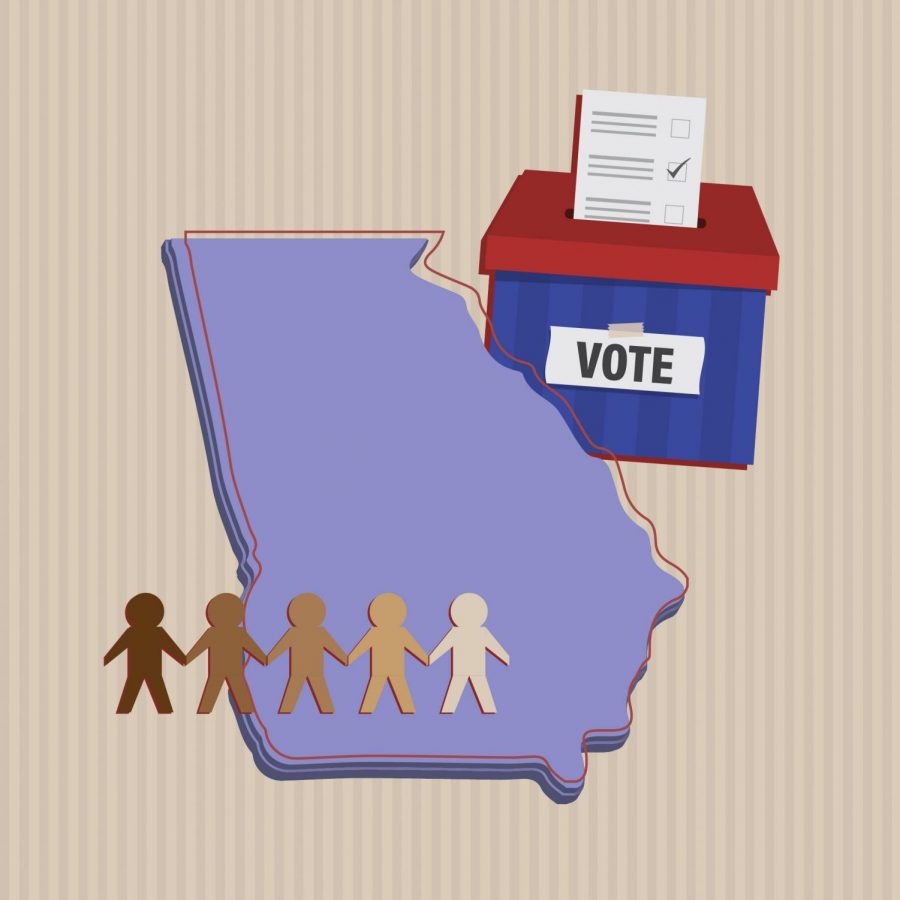A Call for Action Against Georgia Voting Law
The new voting law in Georgia affects voting in a multitude of ways within the state. This law has received mass criticism on how it affects voting within minority populations; while President Biden said this bill “Makes Jim Crow look like Jim Eagle,” it is clear that this bill is targeting a specific demographic and somehow it has made progress in being passed. The law takes the fight against civil rights, such as the right to vote, backwards, reminding us of a time when voting was a near impossible process in minority communities, a time we thought we would only see again in history textbooks.
Isabella Paz, a contributing writer for the New York Times, said through this law “the Republican legislation will undermine pillars of voting access by limiting drop boxes for mail ballots, introducing more rigid voter identification requirements for absentee balloting and making it a crime to provide food or water to people waiting in line to vote.” Long voting lines are most common in predominantly Black neighborhoods in Georgia’s cities such as Atlanta, where a majority of the state’s Democratic voters live. Biden’s opposition to this new voting law is only reasonable; it makes it so that it is marginally more difficult and strenuous to vote in bigger cities like Atlanta, where most of the Democratic voting population lives.
President Biden said this new voting law would end voting hours earlier, meaning working people can’t cast their vote after their shift is over. No matter who this law targets, it is unreasonable to prevent the extension of voting hours until people get off of their jobs; it makes no sense.
This law seems to be a reaction to the most recent outcome in Georgian voting, in which Trump was the first Republican candidate to lose in Georgia in decades. Now, Republican state legislatures continue to draft new legislation aimed at restricting voters’ rights under the name of “election integrity.” The fact that this law has made it this far should be an insult to any true American who believes the right to vote is just as valuable as the right to public education.
It is clear that this new voting law disproportionately affects minorities. It is even more clear that this new voting law is a response to the recent lie that the election was stolen. Republicans feel as if they must make new laws under the umbrella of “election integrity” to ensure that the election isn’t “stolen” again. This new law clearly erases much of the progress made in the fight for civil rights. It washes away years of law and legislation that made it easier for minorities to cast their ballots no matter where they might be at what time.
Big corporations have a responsibility in this issue as well. Coca-Cola is one of the largest companies in Georgia, providing the state with a lot of revenue. At first, Coca-Cola declined to give a statement regarding the law before it was passed, but since then, they have been urged by Black executives and have subsequently given a statement against this law. It is clear that unless urged, Coca-Cola and other big companies in Georgia, such as Delta Airlines, will not take a public stance on the issue. But that shouldn’t be the case; these companies should do even more than just issuing a statement.
Will Smith was recording a new movie in Georgia when this law was being passed and he decided to move his entire production, which was giving Georgia a lot of revenue, out of the state. This is the lead big corporations should follow to bring about change regarding this law.
The new Georgia voting law is clearly detrimental to the progress the United States has made on civil rights, and it must be reversed. Biden opposing this law is great, but there needs to be more than just words said that condemn the law; there must be action taken to remove it indefinitely.
Cory Bork, FCRH ’23, is a communications and culture major from Robbinsville, N.J.

Cory Bork is a senior majoring in communication and culture with a minor in marketing. Beginning in his sophomore year, Cory wrote articles extensively...








































































































































































































